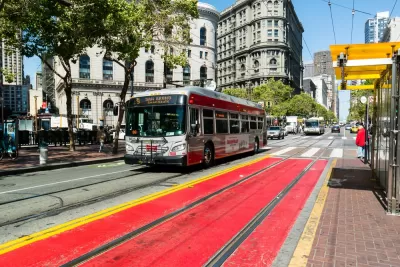The U.S. Environmental Protection Agency wants to force the state of California to spend highway money on public transit, because of the environment.

The Trump administration seems to love to antagonize California, mostly by revoking or weakening environmental regulations, like the recent episode of President Trump announcing via Twitter that California would no longer have a Clean Air Act waiver to require higher emission standards from car companies. Since the beginning of the Trump administration, the state of California has responded to the president's agenda with lawsuit after lawsuit. California also sued to keep its Clean Air Act waiver.
In recent weeks, however, the dynamic has changed, and the Trump administration has begun antagonizing California with threats of environmental enforcement. First, President Trump threatened to punish California with an environmental violation if it didn't take aggressive action to curb homelessness. Late in the day on October 2, the Trump administration followed through on that threat, as reported by Kurtis Alexander and Dominic Fracassa.
More recently, the Trump administration threatened to force the state to spend money intended for highways on public transit instead.
"The Environmental Protection Agency on September 23 threatened to start enforcing long-dormant Clean Air Act provisions that would force many regions in California to stop building new highway projects and instead either transfer that money to mass transit projects or else lose it entirely," reports Jeff Davis.
Davis notes the weirdness of the whole situation: "This sounds like a headline that would have occurred in the Obama Administration during its more ambitious first term, but no, this was in fact the Trump Administration."
The threat is predicated on the letter of the Clean Air Act law, as described clearly by Davis. The letter of the law also means the state wouldn't entirely lose the money, but could be forced to spend it on transit instead of roads.
FULL STORY: EPA Threatens to Make California Transfer Highway Funding to Mass Transit Projects

Maui's Vacation Rental Debate Turns Ugly
Verbal attacks, misinformation campaigns and fistfights plague a high-stakes debate to convert thousands of vacation rentals into long-term housing.

Planetizen Federal Action Tracker
A weekly monitor of how Trump’s orders and actions are impacting planners and planning in America.

In Urban Planning, AI Prompting Could be the New Design Thinking
Creativity has long been key to great urban design. What if we see AI as our new creative partner?

King County Supportive Housing Program Offers Hope for Unhoused Residents
The county is taking a ‘Housing First’ approach that prioritizes getting people into housing, then offering wraparound supportive services.

Researchers Use AI to Get Clearer Picture of US Housing
Analysts are using artificial intelligence to supercharge their research by allowing them to comb through data faster. Though these AI tools can be error prone, they save time and housing researchers are optimistic about the future.

Making Shared Micromobility More Inclusive
Cities and shared mobility system operators can do more to include people with disabilities in planning and operations, per a new report.
Urban Design for Planners 1: Software Tools
This six-course series explores essential urban design concepts using open source software and equips planners with the tools they need to participate fully in the urban design process.
Planning for Universal Design
Learn the tools for implementing Universal Design in planning regulations.
planning NEXT
Appalachian Highlands Housing Partners
Mpact (founded as Rail~Volution)
City of Camden Redevelopment Agency
City of Astoria
City of Portland
City of Laramie





























